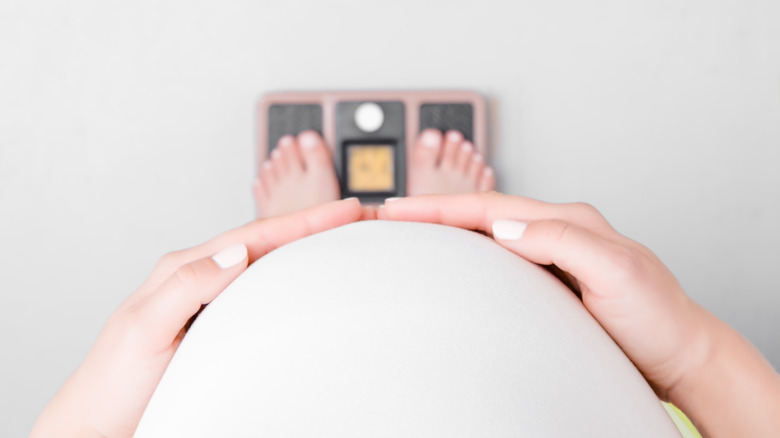Is It Safe To Try To Lose Weight During Pregnancy?
Most people think of pregnancy as a time when weight gain is inevitable. After all, you're growing a baby that will come out weighing an average of seven pounds if carried to full term, as per the University of Rochester Medical Center. Pregnant individuals gain more than just the weight of the baby. However, this is because the weight of the placenta, enlarged breasts, amniotic fluid, increased blood volume, and more also contribute to the numbers on the scale ticking upward, explains the Mayo Clinic. Overall, the current recommendations for weight gain during pregnancy depend on BMI and the number of babies.
For a pregnant person carrying one baby with a BMI less than 18.5, the recommended weight gain is anywhere from 28 to 40 pounds, states the Centers for Disease Control and Prevention (CDC). For a BMI between 18.5 and 24.9, this drops to between 25 and 35 pounds. Someone with a BMI of 25 to 29.9 should gain around 15 to 25 pounds, while those with a BMI over 30 should shoot for between 11 and 20 pounds. The amount of weight gained during pregnancy is important because it can determine whether a baby is born too small or too large, both of which can lead to complications during birth and immediately following.
If you start your pregnancy at a higher weight, you may be wondering if it's possible to lose weight instead of gaining it. Here's what we know.
Trying to lose weight during pregnancy can be risky
Being at a healthy weight during pregnancy is ideal as it prevents certain potential complications, as per Healthline. For example, if the pregnant individual is obese, this puts them at a higher risk for developing preeclampsia, gestational diabetes, and blood clots. It can also negatively affect the baby, putting them at risk for stillbirth, premature birth, and the development of heart defects. Some weight gain is to be expected during pregnancy even for those starting out with a higher BMI, but actively trying to lose weight may not always be the safest route.
Since most weight-loss regimens revolve around restricting diet, pregnancy isn't the best time to try to minimize calories, explains Baby Center. A developing baby needs enough calories and nutrients to grow properly and diets that encourage restrictions or elimination of key macronutrients can put them at risk. A 2015 meta-analysis published in the journal PLOS One looked at several studies that examined weight loss versus weight gain in obese pregnant individuals and concluded that due to the risk of complications to the baby, doctors should not recommend weight loss during pregnancy.
While actively pursuing weight loss during pregnancy isn't a good idea, there are steps you can take to optimize your health during this time. For example, the American College of Obstetricians and Gynecologists recommends 150 minutes of moderate exercise spread over the course of a week as long as this is approved by an individual's doctor.


